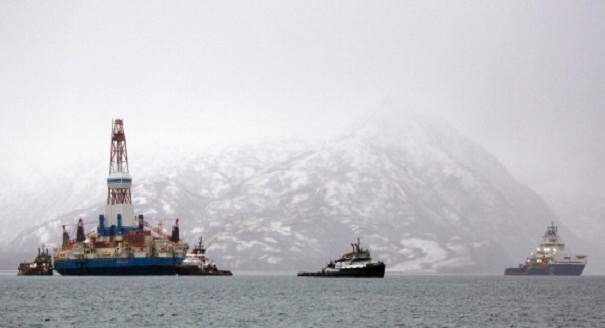Source: Conference Report and Recommendations to the Arctic Council and Interested Parties
The Arctic is a region where North America, Europe, and Russia, working with indigenous peoples and interested non-Arctic states, have taken initial steps to make the Arctic a zone of peace, cooperation and stable, sustainable development. The Arctic Council remains the primary structure for Arctic-wide governance and policy formulation. Key to achieving greater and more effective cooperation is now to build, strengthen and sustain greater involvement of interested non-Arctic states, indigenous peoples organizations, public/private partnerships, and industries active in the Arctic. The Arctic has become a venue that demonstrates the advantages and benefits to be derived from inclusive cooperation among Russia, Western Europe’s Arctic states, and North America.Because of the accelerating pace of global warming and rapidly receding sea ice, linked with accelerating economic and social change in the region, Arctic states and a growing number of non-Arctic states and organizations are showing increased interest in and attention to a growing range of northern policy issues. These stakeholders recognize that Arctic environmental and security challenges affect all of them and require cooperation at multiple levels. The Arctic coastal states are pursuing claims for extending their territorial shelf and are acting to delineate and protect their borders. Differences are being adjudicated under the procedures of the U.N. Convention on the Law of the Sea (UNCLOS) and through diplomatic channels. Cooperation is the norm.
The prospects for resolving issues in the region by military force are presently slight; on the contrary, Arctic nations today accept that cooperation represents the most effective and efficient means to build sustainable, mutual security in the Arctic on issues such as oil spill preparedness and prevention; environmental pollution and food security; shipping regulation and maritime safety, especially cruise ship operations; threats to individual and community health and the cultural well-being of indigenous peoples; and natural disasters. The Arctic Council should strengthen this trend by encouraging cooperation between the respective militaries and coast guards in areas such as search and rescue and emergency-response joint training exercises; development of a common operating picture to increase situational awareness in the Arctic; and establishment of an Arctic Maritime Forum to share maritime information to further stability and shipping safety.
The Arctic is rich in energy and other natural resources, which are becoming more accessible with warming conditions and eventually will be developed. But access and development will be expensive, and world prices will be a major factor in determining the pace of energy development. The sharp increase in the world supply of gas is already producing uncertainty for some Arctic energy development projects. Arctic shipping is increasing as seasonal sea ice declines, but will remain largely destinational for the transport of Arctic energy and mineral resources. Economic considerations stemming from difficult sea ice conditions and the unpredictability of shipping schedules under Arctic conditions will severely limit the growth of trans-Arctic container shipping.
Arctic governance as provided by the Arctic Council, including its rotating chairmanship, working groups, the Permanent Participants (indigenous peoples’ organizations) and a newly established permanent secretariat, has proven sufficiently flexible to handle effectively an evolving agenda of Arctic issues. The Arctic Council serves as a valuable forum for the Arctic states, which themselves primarily define the norms and rules of the Arctic governance regime. There would be little if any benefit to Arctic governance in making the Council a formal international organization at this time, nor is there a perceived need for a new, comprehensive Arctic treaty.
Arctic Council member states, Permanent Participants, and observers should, however, continue to strengthen Council structures and improve outreach to increase international awareness of the importance of the Arctic region to global security and environment.
Key Recommendations for the Arctic Council:
- Support the urgent adoption of a mandatory Polar Code through the International Maritime Organization (IMO) for ships operating in polar waters along with regulations for the safeoperation of cruise ships in the Arctic.
- Establish a dialog with the armed forces and coast guards of the Arctic states to increase the safety of operations in Arctic waters and encourage confidence-building mechanisms.
- Establish an Arctic economic or business forum, which would promote public-private partnerships, foster job creation, and facilitate resolution of Arctic issues involving private sector interests.
- Develop the capacity to foster relationships between industry and communities, including identifying public-private partnerships that promote sustainable communities and best practices.
- Develop a structure to collect Arctic-specific and international data dealing with oil spill preparedness, prevention, and remediation and establish a clearinghouse for information sharing and publication of public and private data.
- Consider the creation of one or more additional mechanisms, beyond Arctic Council observer status, for engaging with non-Arctic states and other interested entities that have interests in specific Arctic issues. Conduct periodic reviews of the structure, activities, and charters of Council working groups.
- Strengthen the capacity of Arctic indigenous peoples to work through their Permanent Participant representatives in engaging with the Arctic Council.
- Support capacity for more indigenous peoples to become leaders in health care delivery and research to develop a health care system that is consonant with their culture and respects self-determination.
- Improve communication efforts and outreach, including to international fora, to enhance regional and global understanding of the importance of the Arctic and of the Arctic Council and its work.





